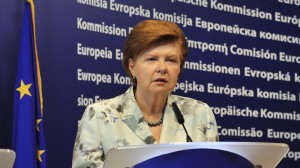
Vīķe-Freiberga is currently the only female up for job of president and she might emerge as a compromise winner; compromise or not, Europe would be lucky to have her.
European leaders will gather Thursday evening in Brussels to select who will fill two top jobs created by the recently-ratified Lisbon Treaty.
A new, permanent president of the European Council replaces the rotating presidential system currently used. Further a high representative for foreign affairs and security policy will merge two positions, from the Council and Commission, into one more powerful position.
Together they are meant to increase the European Union’s world profile and enhance internal cooperation and decision-making. Several names of European leaders are floating around for the top job of president. Tony Blair, Britain’s former Prime Minister, is among the candidates, but his celebrity and home country’s relations to the EU are at times in the debate both benefits and drawbacks. Belgian Prime Minister Herman Van Rompuy is considered the favorite because he was able to hold his country together and he has the backing of Germany and France; however, rumors of a secret deal by Germany and France to put Van Rompuy in the position may backfire and derail his candidacy. Other contenders include Luxembourg’s Prime Minister Jean-Claude Juncker, Dutch Prime Minister Jan Peter Balkenende, and former Latvian President Vaira Vīķe-Freiberga.
Former Italian Prime Minister Massimo D’Alema has become the favorite for high representative, after British Foreign Secretary David Miliband removed his name from consideration. D’Alema’s communist background may not bode well though, especially in Eastern Europe. Another such as Olli Rehn, the Finnish European Commissioner for Enlargement, might take the lead instead.
The two positions are meant to complement each other and to balance the Union. If the post of European Council president goes to a politician from the center-right, as is expected since most European governments lean that way, then the high representative is likely to be from the center-left.
Similarly, the positions are likely to be balanced giving one post to a Western country and one to the East. If one goes to a large country, the other will supposedly go to a small one.
Yet one act of balancing is not being suggested by many and that is if one position goes to a man, a woman should occupy the other. For all the excitement over the top jobs, one fact remains that far too few women are in the running. Vīķe-Freiberga is currently the only female up for job of president and she might emerge as a compromise winner; compromise or not, Europe would be lucky to have her.
Vīķe-Freiberga would mark a win for gender equality for the EU. Only 9 of the 27 European commissioners and about one-third of the members of European Parliament are women. Only a handful of Council presidents in history were female. Yet, women make up 52 percent of Europe’s population.
After Hillary Rodham Clinton lost her bid to be president of the United States last year, the EU could send a strong message to the rest of the world that its top jobs are open to women. Vīķe-Freiberga, the Swedish European Commissioner for Institutional Relations and Communication Strategy Margot Wallström, and the Dutch European Commissioner for Competition Neelie Kroes have pushed the issue to media and other EU officials.
Unfortunately, their efforts seem to be making little headway in persuading even women leaders such as German Chancellor Angela Merkel that a woman is right for the job. Nevertheless, Vīķe-Freiberga is as qualified as any of the male candidates and she’s expressed outright interest in taking the EU helm.
After her presidency of Latvia she has served on a Reflection Group on the long-term future of the EU. Her brand of centrist politics and pragmatism will be well suited to the job of consensus building needed in guiding reforms through the Council. As the principle EU stateswoman, she can swoon diplomats in Latvian, French, English, German, and Spanish. She’s no doubt tough, intelligent, and respectable and the importance of her candidacy is more substantial than just her gender.
During her campaign for the job of EU President, Latvia’s “Iron Lady” has made calls for greater transparency in EU decision-making. Her demands for the EU to stop working like the Soviet Union will resonate well with the East. What’s more, her presidency, if successful, could generate more public interest in the East for the EU and persuade the new member states that their interests are known in Brussels. She has a strong case to make, and Eastern Europe needs such a powerful voice in European leadership.
If the Union wants Massimo D’Alema as the high representative, Vīķe-Freiberga would make a perfect foil as president. D’Alema is a male from a big state in the West (Italy) and is on the left. Vīķe-Freiberga is a female from a small state in the East (Latvia) and leans right. Neither personality would overshadow the other and they would drive the EU into consensus. Vīķe-Freiberga will be the dark horse of the selection for EU President.
The first occupier of the post will be critical to defining the position, so the selection is extremely important. But the former Latvian president could overcome the Western, male bias of the EU elite and reinvigorate the bloc. She is precisely what the EU needs, so European leaders should choose wisely.
Michael G. Dozler is a graduate student of international affairs who received a Fulbright research grant for study in Latvia.
Disclaimer:
Views expressed in the opinion section are never those of the Baltic Reports company or the website’s editorial team as a whole, but merely those of the individual writer.












